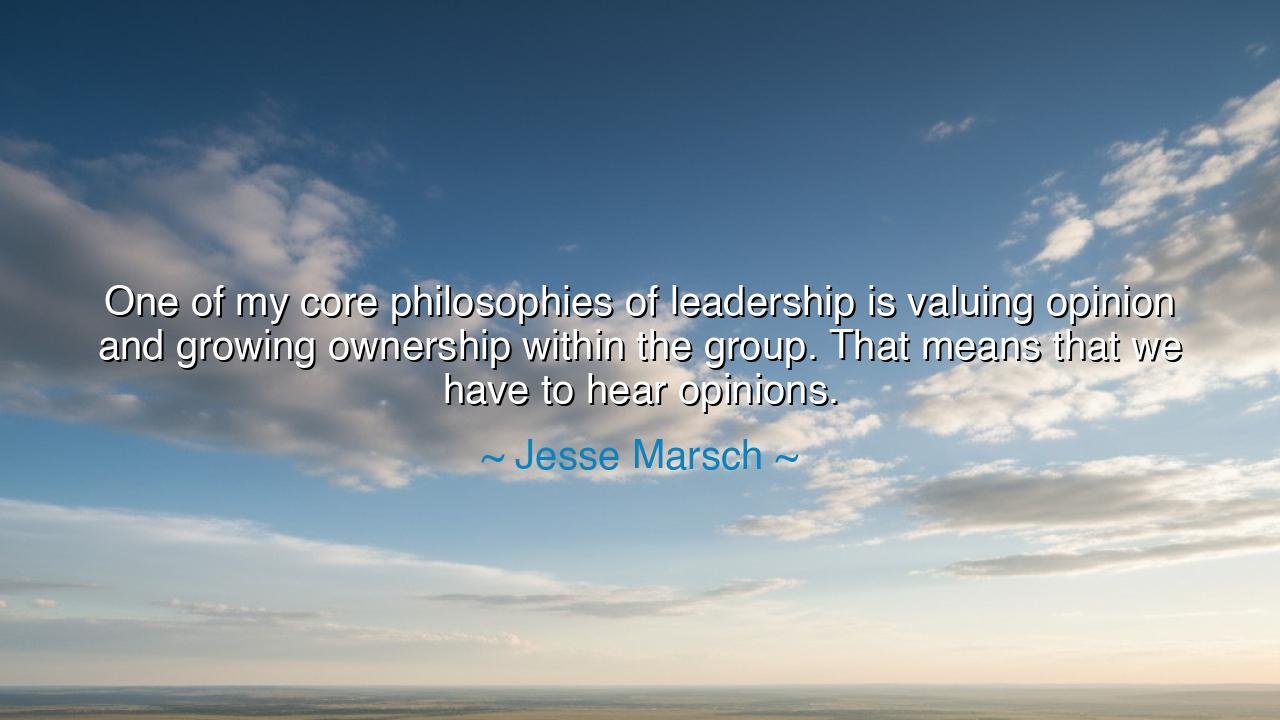
One of my core philosophies of leadership is valuing opinion and
One of my core philosophies of leadership is valuing opinion and growing ownership within the group. That means that we have to hear opinions.






When Jesse Marsch, the American football manager known for his passion and humanity, declared, “One of my core philosophies of leadership is valuing opinion and growing ownership within the group. That means that we have to hear opinions,” he was not speaking of sport alone, but of the eternal craft of leadership itself. Beneath the surface of his words lies an ancient truth — that a leader’s strength is not found in domination, but in listening, not in command alone, but in collaboration. For the wise have always known that the voice of one, however gifted, cannot match the chorus of many guided by trust.
The origin of this philosophy comes from Marsch’s journey through the fields of both triumph and trial. Having led teams in America and across Europe, he learned that to unite diverse hearts under a single banner, one must first make them feel heard. A team, like a nation or a family, is not an army of servants obeying a master — it is a living body, each member a vital organ that must feel its own purpose. Marsch’s words remind us that true leadership does not silence opinion for the sake of control; it cultivates ownership for the sake of unity. For when people are invited to speak, they do not merely follow — they belong.
This belief finds its echo in the wisdom of antiquity. In the golden age of Athens, Pericles led not by fear, but by persuasion. He listened to the voices of citizens in the assembly, respecting even the humblest speaker, for he knew that democracy was not the rule of one, but the harmony of many. Through this practice, Athens grew — not only in power, but in spirit — for its people felt the city was their own. Likewise, Marsch’s philosophy teaches that when leaders value opinion, they awaken the creative force of their people. The energy of the group, once released, becomes greater than the sum of its parts.
In contrast, history also shows the folly of leaders who refuse to listen. The Emperor Xerxes of Persia, blinded by pride, silenced his generals and ignored their counsel before the invasion of Greece. His army, vast as the sea, fell before smaller forces united by conviction and cooperation. His downfall was not due to lack of strength, but lack of wisdom — the inability to hear. Jesse Marsch’s insight is therefore not confined to the field of sport, but to the field of life: leadership that deafens itself to others’ voices becomes the architect of its own defeat.
The heart of Marsch’s quote lies in the phrase “growing ownership within the group.” To grow ownership is to nurture the seeds of responsibility, to help others feel that success and failure are shared. The great leader is not the one who takes credit for victory, but the one who ensures that every follower sees themselves in it. When each person feels their opinion matters, their spirit ignites; they labor not out of duty, but out of devotion. In this way, the leader becomes not a ruler, but a gardener, tending to the growth of others. And from such gardens bloom loyalty, innovation, and strength that no tyranny can command.
In modern times, we saw this same principle embodied by Nelson Mandela, who, upon leading a divided South Africa, chose not to dictate, but to listen. He invited former enemies into his council, heard their fears, and gave them a stake in the nation’s rebirth. Through this act of valuing opinion, he turned bitterness into cooperation, and despair into unity. His leadership proved that hearing others is not weakness — it is power of the highest kind, for it transforms conflict into community.
The lesson of Jesse Marsch’s words, then, is clear: leadership begins with listening. To lead is not to stand above others, but to stand among them — to make their voices part of your vision. The leader who listens learns; the one who silences loses. In every group, whether a team, a company, or a family, there is wisdom scattered like sparks among its members. The task of the leader is to gather those sparks and forge them into flame.
So let this teaching echo in the hearts of all who aspire to lead: Value opinion. Grow ownership. Listen deeply. Do not fear the noise of many voices, for within them lies truth. The greatest leaders of the past and future are not those who command with arrogance, but those who inspire with understanding. For when you hear others, you allow them to see themselves in your cause — and when people see themselves in the vision, they will follow it to the ends of the earth.






AAdministratorAdministrator
Welcome, honored guests. Please leave a comment, we will respond soon